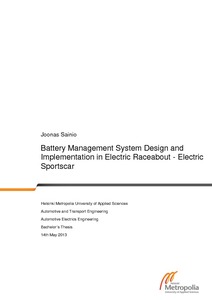Load Management Solutions for Electric Vehicle Chargers in a Software as a Service Platform
Gainulenko, Apollinariia (2021)
Gainulenko, Apollinariia
2021
All rights reserved. This publication is copyrighted. You may download, display and print it for Your own personal use. Commercial use is prohibited.
Julkaisun pysyvä osoite on
https://urn.fi/URN:NBN:fi:amk-2021052010028
https://urn.fi/URN:NBN:fi:amk-2021052010028
Tiivistelmä
Electric vehicle charging poses a problem to the current electrical system infrastructure. The total energy consumption can rise to an exceptionally high level when multiple EV charging stations are using high power simultaneously. Electrical system overload is risky because it can lead to power outages and high-cost electrical bills. The problem can be resolved by upgrading hardware on the charging site. However, it is not cost-efficient.
This thesis presents an alternative solution by utilizing load management. The main goal of this project was to design and implement load management solutions for electric vehicle chargers in the cloud platform. Solutions were developed utilizing microservice architecture, and various technologies were used: Docker, Kubernetes, React.js, Node.js, Express, Redis, PostgreSQL, and TimescaleDB. Power consumption on the site was measured with an external hardware module. Solutions support chargers that operate on Open Charge Point Protocol version 1.6 JSON.
Dynamic Load Management distributes available power evenly among all the active charging stations on the site. Adaptive Load Management reacts to the real-time change in energy consumption on the site and distributes available power accordingly to the charge points. Both solutions were continuously tested with genuine chargers and electric cars. Upon test results, needed changes were implemented.
This thesis also covers current implementation disadvantages and suggests possible improvements.
This thesis presents an alternative solution by utilizing load management. The main goal of this project was to design and implement load management solutions for electric vehicle chargers in the cloud platform. Solutions were developed utilizing microservice architecture, and various technologies were used: Docker, Kubernetes, React.js, Node.js, Express, Redis, PostgreSQL, and TimescaleDB. Power consumption on the site was measured with an external hardware module. Solutions support chargers that operate on Open Charge Point Protocol version 1.6 JSON.
Dynamic Load Management distributes available power evenly among all the active charging stations on the site. Adaptive Load Management reacts to the real-time change in energy consumption on the site and distributes available power accordingly to the charge points. Both solutions were continuously tested with genuine chargers and electric cars. Upon test results, needed changes were implemented.
This thesis also covers current implementation disadvantages and suggests possible improvements.
Kokoelmat
Samankaltainen aineisto
Näytetään aineisto, joilla on samankaltaisia nimekkeitä, tekijöitä tai asiasanoja.
-
Solar Electricity Utilization in Finland : An Hourly Comparison of Photovoltaic System Output Data and Simulated Building Electricity Load Profiles
Meyer, Joachim (Metropolia Ammattikorkeakoulu, 2015)The goal of this thesis was to emphasize the importance of comparing photovoltaic (PV) elec-tricity production and building electricity load profiles on an hourly basis in order to assess the feasibility of grid-connected ... -
Study on Consumer Demand on Electric Cars: The challenges related to battery electric vehicle adoption in Europe and expectations set by the customer base of Škoda Finland
Mattila, Jari (2019)Sähköauto on aiheena yksi keskeisimpiä ja ajankohtaisimpia tämän päivän autoteollisuudessa ja mediassa. Aihe herättää kiinnostusta myös laajalti alan ulkopuolella, ja lähestulkoon kaikki eurooppalaiset kuluttajat ovat ... -
Battery Management System Design and Implementation in Electric Raceabout - Electric Sportscar
Sainio, Joonas (Metropolia Ammattikorkeakoulu, 2013)The purpose of this Bachelor´s study was to design and implement a new user-configurable battery management system into Electric Raceabout – electric sports car. This new improved system design would replace the old battery ...



